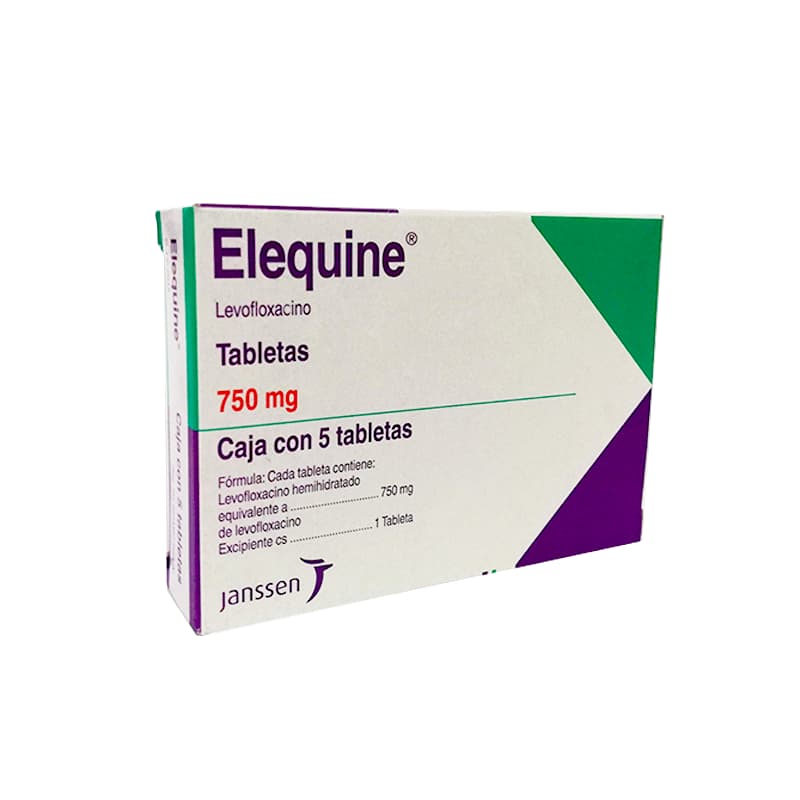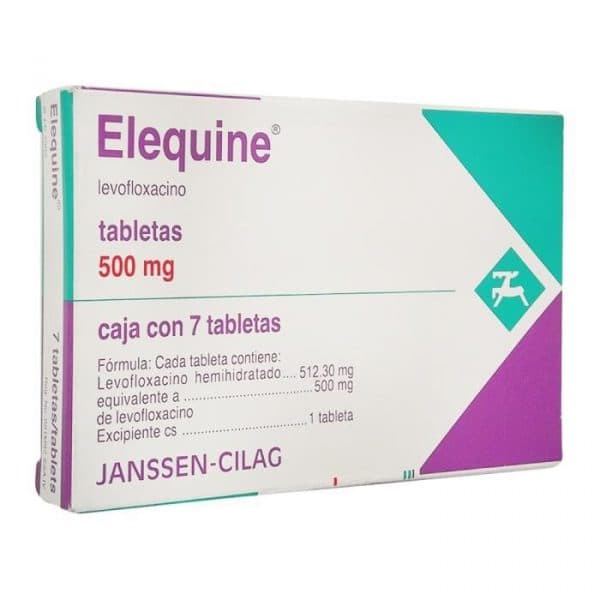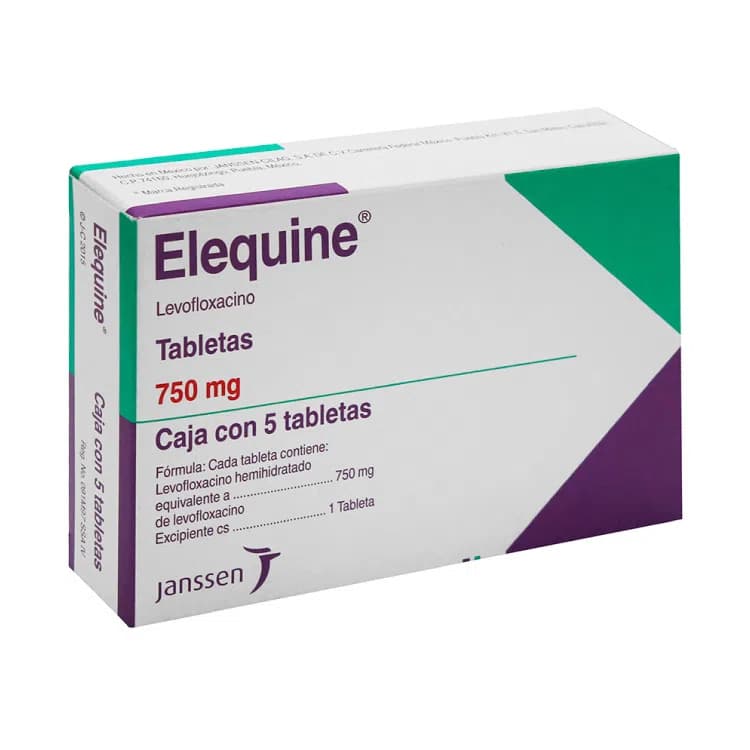Elequine Tablets: Uses, Side Effects And More
Elequine tablets are a medicine whose active ingredient is levofloxacin, used to treat bacterial infections in many different parts of the body.
Elequine tablets are often used to treat the following conditions:
- Prevention of anthrax infection after inhalation exposure
- to treat and prevent plague (including septicemic or pneumonic plague)
You can find these tablets in the form of 500 milligrams and 750 milligrams.
This antibiotic can also be used for purposes other than those listed above.
Levofloxacin, the active ingredient in the drug, belongs to the drug class known as quinolone antibiotics.
This active ingredient works by killing bacteria or preventing their growth.
It should be noted that this ingredient will not work for colds, flu or other viral infections.

What Will We Learn?
Things To Pay Attention
When deciding to use Elequine tablets, the risks of taking the drug should be weighed against the benefits it will do.
The conditions listed below should be considered when using this medicine.
- Allergies: Tell your doctor if you have ever had any unusual or allergic reaction to the active ingredients of Elequine or to any other medicines. Also, tell your healthcare provider if you are allergic to preservatives, dyes, foods, or animals.
- Use in Children: Scientific studies have not shown any effect to limit the use of levofloxacin, the active ingredient in the drug, in children. However, due to the toxicity of this drug, other alternative drugs should be considered. Elequine tablets may be prescribed by a doctor if other alternative drugs are found to be ineffective. Levofloxacin, the active ingredient in the drug, can be used in children aged 6 months and older to treat plague infection or to prevent anthrax infection after possible exposure.
- Use in the elderly: Scientific studies have not shown any effect to limit the use of levofloxacin, the active ingredient in the drug, in the elderly. However, elderly patients should be cautious and adjust the dose when taking this drug because they are more likely to have age-related tendon disorders (including tendon rupture) and kidney, liver or heart problems that may require it.
Pregnancy And Breastfeeding
There are not enough studies in women to determine infant risk when using elequine while breastfeeding.
The potential benefits must be weighed against the potential risks before taking elequine tablets while breastfeeding.
If you are going to use this medicine while pregnant, talk to your doctor.

Drug interactions
Some drugs can interact with this drug and increase the risk of side effects.
In such cases, your doctor may change the dose of one of the two drugs you take or stop the use of one drug completely.
The drugs listed below are not a complete list of drugs that may interact with elequine tablets.
Give your doctor a list of all the medications you use to minimize the risk of drug interactions.
It is generally not recommended to use elequine tablets in combination with the medicines listed below:
- Bepridil
- Cisapride
- Unmanned aerial vehicle
- Mesoridazine
- Pimozide
- Piperazine
- Saquinavir
- Sparfloxacin
- Terfenadine
- Thioridazine
- Ziprasidone
Other Interactions
Elequine tablets can interact not only with medications, but also with meals and certain types of food.
Tell your doctor if you use alcohol, cigarettes, or narcotics.
Other Medical Issues
The presence of certain diseases may affect the use of this medicine.
If you have the health problems listed below or if you have had these diseases before, be sure to seek advice from your doctor before using this medicine.
- Aortic aneurysm (swelling in the wall of the largest artery)
- Bradycardia (slow heartbeat)
- Diabetes
- Diarrhea
- Heart rhythm problems (eg, prolonged QT interval)
- Hypokalemia (low potassium in the blood)
- Liver disease (eg hepatitis)
- Mental illness
- Myocardial ischemia (decreased blood flow to the heart)
- Seizures (epilepsy)
- Brain disease
The use of this medicine in the following conditions may make your disease worse:
- Kidney disease
- If you have had an organ transplant
- Tendon disorder
Elequine should not be used in patients suffering from severe muscle weakness.
If you are going to use the medicines listed below after taking Elequine tablets, take them at least 2 hours before or 2 hours after.
- Didanosine buffered tablets for oral suspension
- Oral suspension
- Sucralfate or antacids
- Aluminum
- Magnesium
- Other products containing iron or zinc
The medicines listed above may affect how elequine tablets work.
How To Use Elequine Tablets
Swallow the Elequine Tablets with a full glass of water without chewing.
In some cases, you can also use this medicine by dividing it into two places to adjust the dose.
The dose of this medicine may vary depending on the type of disease.
Be sure to strictly follow label directions and your doctor’s recommendations.
The information listed below is just the usual dose of the medicine and do not change your dose if your doctor has prescribed a different dose.
The number of doses you take each day, the time allowed between doses, and the length of time you take the medicine depend on the severity of your illness.
Usual dose for anthrax infection:
- For adults and children 6 months of age and older who weigh 50 kilograms (kg) or more, the usual dose is 500 milligrams (mg) once daily for 60 days.
- The usual dose for children 6 months and older weighing 30 kg to 50 kg is 250 mg every 12 hours for 60 days.
- Usual dose for children under 6 months of age or weighing less than 30 kg: The dose and use should be determined by your doctor.
Usual dose for plague infection:
- The usual dose for adults and children 6 months of age and older weighing 50 kilograms (kg) or more is 500 milligrams (mg) once daily for 10 to 14 days.
- The usual dose for children 6 months and older weighing 30 kg to 50 kg is 250 mg every 12 hours for 10 to 14 days.
- If it is to be used for children under 6 months of age or weighing less than 30 kg, the use and dose should be determined by your doctor.
Usual dose for infections:
- The usual dose for adults is 250 to 750 milligrams (mg) once a day.
- The usual dose for children, use and dose should be determined by your doctor.
If you miss a dose, take it as soon as possible. However, if your next dose is nearing, skip the missed dose and go back to your normal dosing schedule.
Do not take a double dose to make up for the missed dose as this can cause side effects and serious health problems.
Store the medicine tightly closed at room temperature, away from heat, moisture and direct light.
To prevent your children from accidentally swallowing this medicine, keep it out of your child’s reach.
Precautions
Regular doctor visits are very important to make sure the medicine is working properly.
Your doctor may ask you for urine and blood tests to check for unwanted effects.
If your or your child’s symptoms do not improve within a few days or if they get worse, contact your doctor immediately.
The drug’s active ingredient, levofloxacin, may rarely cause inflammation (tendinitis) or tear of a tendon (the cord that connects muscles to bones).
Such conditions can usually occur while taking the drug or after you have finished using it.
Talk to your doctor before using this medicine if:
- If you are taking steroid medications (eg dexamethasone, prednisolone, prednisone or Medrol®)
- If you are over 60
- If you have serious kidney problems
- If you have a history of tendon problems
- If you have had an organ transplant
This medicine can cause serious allergic reactions, including anaphylaxis, which can be life-threatening.
If you or your child experience any allergic reaction, contact your doctor immediately.
The active ingredient in the medicine can reduce the number of certain types of blood cells in your body.
The reduction of these cells makes it easier for you to bleed or get an infection.
Therefore, it is better to stay away from sick people.
Levofloxacin, the active ingredient in the drug, can cause serious liver problems, including hepatitis.
Check with your doctor right away if you or your child develops nausea or vomiting, light-colored stools, dark urine, stomach pain, or yellow eyes or skin while using Elequine.
This medicine can cause diarrhea, and in some cases this discomfort can be severe.
This diarrhea may also occur 2 months or more after you stop using Elequine.
Do not use any anti-diarrheal medication without talking to your doctor.
Some diarrhea medications can make your condition worse.
If diarrhea continues or worsens, talk to your doctor immediately.
Tell your doctor right away if you or your child develops numbness, tingling, or burning pain in the arms, hands, legs, or feet after using Elequine.
These symptoms may be a sign of a problem called peripheral neuropathy.
These measures are not an article with full recommendations. Talk to your doctor for comprehensive advice.

What Are The Side Effects of Elequine Tablets?
Elequine tablets may cause some unwanted effects as well as their necessary effects.
Not everyone experiences these side effects, but sometimes side effects can occur and may require medical attention.
The side effects that may occur when using Elequine tablets are listed below:
- Diarrhea (common)
- Change in taste
- Constipation
- Numbness
- Headache
- Dizziness
- Nausea
- Irritability
- Stomach pain or discomfort
- Sleep problem
- Vaginal itching and discharge
- Vomiting
The following side effects are serious and require immediate medical attention:
- Confusion or disorientation (rare)
- Blisters (rare)
- Bloody diarrhea (rare)
- Fever (rare)
- Pain, inflammation, or swelling of the shoulders, legs, or calves of the hands (rare)
- Skin redness or swelling (rare)
- Skin burning sensation (rare)
- Stomach cramps and pain
- Blurred vision
- Skin rash
- Unusual behavior
- Sweating
- Cough
- Dark urine
- Yellow eyes
- Fainting
- Difficulty breathing
- Palpitations
- Sound restriction
- Muscle cramps
- Seizures
It should be noted that the side effects listed above do not appear in everyone, and they are not all of them.
If you do not feel well during the use of the drug, stop using it and inform your doctor.
You can report side effects to the FDA at 1-800-FDA-1088.
Helpful Foods For People With Bacterial Infections
It is thought that some foods may have anti-inflammatory and immune-boosting properties in fighting bacterial infections and supporting overall health. However, it is important to remember that these foods are not a replacement for medical treatment, but can only play a supporting role. Here are some foods that may help with bacterial infections:
- Garlic: Garlic has antimicrobial and anti-inflammatory properties. It may help strengthen the immune system and be effective against some bacteria.
- Ginger: Ginger has antioxidant and anti-inflammatory properties. It may also soothe stomach problems and support overall health.
- Yogurt and Fermented Foods: Yogurt and fermented foods containing probiotics can support the digestive system and strengthen the immune system. Healthy gut microbiota plays an important role in fighting infections.
- Honey and Propolis: Honey has antibacterial properties and can relieve a sore throat. Propolis also has naturally antiviral and antimicrobial properties.
- Green Tea: Green tea is known for its antioxidant content. It can support the immune system by fighting against free radicals in the body.
- Fish and Omega-3 Fatty Acids: Omega-3 fatty acids are found in fish and have anti-inflammatory properties. Foods containing omega-3 can reduce inflammation and support the immune system.
- Vegetables and Fruits: Colorful vegetables and fruits are rich in antioxidants, vitamins and minerals. These nutrients can strengthen the immune system, supporting overall health.
- Water: It is important to drink enough water to flush toxins from the body and support overall health. Water can help fight infections.
With any health condition, especially bacterial infections, it is important to follow your doctor’s recommendations. Keep in mind that these foods are not a replacement for a treatment plan and can only support overall health and the immune system.
You may also notice our article on the Ardosons drug used in the treatment of acute pain.
